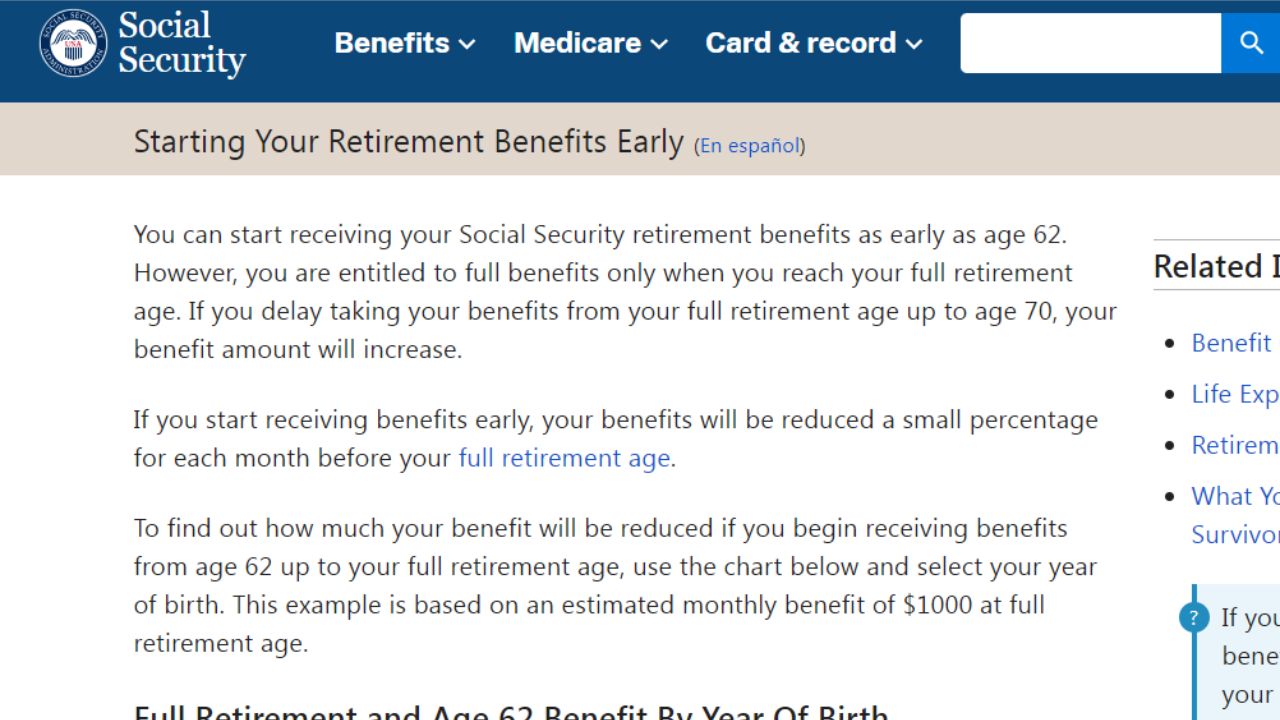Social Security Retirement Age 2025: If you’ve always planned your golden years around retiring at 67, it might be time to rethink that timeline. With recent developments in the federal conversation, the Social Security Retirement Age 2025 could be moving up, creating a ripple effect on how Americans approach work, savings, and when they finally clock out for good.
The Social Security Retirement Age 2025 discussions are gaining momentum due to the program’s financial outlook. As lawmakers debate raising the full retirement age to 68, 69, or even 70, millions of future retirees could find themselves working longer, saving more aggressively, and adjusting expectations for when and how they leave the workforce.
Social Security Retirement Age 2025 – What’s the Real Impact?
The reality is, increasing the Social Security Retirement Age 2025 isn’t just a policy tweak—it fundamentally shifts retirement planning for every generation under 50. A higher FRA (Full Retirement Age) means reduced early retirement payouts and delayed access to full benefits. That creates a bigger burden on individuals to close the financial gap with personal savings or continue working past the traditional retirement age.

This proposed change will impact Millennials and Gen Z the most, potentially pushing their retirement horizon well into their 70s. The earlier you understand this shift, the better you can prepare your long-term financial plan.
Overview: Social Security Retirement Age 2025
| Category | Details |
| Current Full Retirement Age | 67 (for those born 1960 or later) |
| Proposed Full Retirement Age | 68–70 (based on birth year) |
| Trust Fund Status | Expected depletion by 2034–2035 |
| Post-2035 Benefit Payment | About 77% of scheduled benefits |
| Policy Options Under Review | Raise FRA, increase payroll tax, means-testing |
| Most Affected Groups | Millennials, Gen Z, low-income earners |
| Early Claim at 62 | Could see 35–40% reduction in benefits |
History of Social Security and Retirement Age in the U.S.
The Social Security system was introduced in 1935 when the average life expectancy was just 61. Back then, the full retirement age was 65—meaning not everyone lived long enough to receive benefits. As Americans started living longer, the system needed to adapt.
In 1983, Congress passed reforms that gradually increased the retirement age to 67 for people born in 1960 and beyond. The logic was simple: longer lives meant longer benefit payouts. Fast forward to today, with life expectancy nearing 77 and the worker-to-retiree ratio shrinking, a further increase in the retirement age is back on the table.
Why Policymakers Want to Raise the Age Beyond 67?
The math just doesn’t add up anymore. Social Security is funded primarily through payroll taxes, but with fewer workers per retiree and longer lifespans, the outflows are surpassing inflows. The Social Security Retirement Age 2025 change is seen as a practical, phased-in solution.
Other policy ideas being discussed include lifting the payroll tax cap, means-testing benefits for higher-income Americans, or adjusting COLA (cost-of-living adjustments). However, raising the retirement age is viewed by many lawmakers as the most straightforward way to extend Social Security’s solvency without slashing current benefits.
What the New Retirement Age Could Look Like
If the proposed changes are enacted, here’s how the Social Security Retirement Age 2025 would play out by birth year:
| Year of Birth | Current FRA | Proposed FRA |
| 1960 or later | 67 | 68 |
| 1970 or later | 67 | 69 |
| 1980 or later | 67 | 70 |
For early retirees who plan to claim at 62, this could mean benefit reductions as high as 40%. The full monthly benefit would only kick in at the new FRA, dramatically changing retirement planning for younger generations.
What This Means for Your Social Security Benefits
Let’s say your full benefit at 67 is $2,000/month. Under current rules:
- Retiring at 62 gives you about $1,400/month (30% reduction).
- Waiting until 70 gets you around $2,480/month (thanks to delayed retirement credits).
But if the Social Security Retirement Age 2025 increases to 70:
- Retiring at 62 could drop your monthly payment to $1,200 or less.
- 70 becomes the new “full” retirement benchmark.
- Any retirement beyond 70 won’t yield much increase, as benefit growth caps.
This would push many Americans to work longer or rely more on personal savings, pensions, or investment income.
Who Will Be Affected the Most?
The effects of the Social Security Retirement Age 2025 won’t be evenly distributed. Here’s who gets hit the hardest:
- Millennials and Gen Z: Most likely to face a full retirement age of 69 or 70.
- Low-income earners: Often rely solely on Social Security and may be unable to work longer due to health or physical demands.
- Women: Statistically live longer and may need benefits for more years—delaying access increases risk of outliving resources.
- Blue-collar workers: Face physical job demands that make working into their 70s unrealistic.
- Older high-income earners: Least impacted due to multiple income streams and private retirement planning.
How to Prepare If Retirement Age Increases?
A higher Social Security Retirement Age 2025 doesn’t mean retirement is impossible—it just means you need to take more control of it.
1. Start Saving Early
The earlier you contribute to a 401(k), IRA, or Roth account, the more your money can grow through compounding.
2. Diversify Income Sources
Don’t depend on Social Security alone. Explore investments in stocks, real estate, or even part-time income after retirement.
3. Delay Claiming Benefits
If you’re healthy and able, each year you delay claiming Social Security after your FRA boosts your monthly check by roughly 8%.
4. Explore Flexible Work
Part-time or remote roles can help bridge the gap between retirement and full benefit eligibility without burning out.
The Bigger Picture: Why This Change Matters
By 2030, every Baby Boomer will be over 65. Meanwhile, the ratio of workers to retirees will drop to just 2:1 by 2035, down from 5:1 in 1960. That imbalance puts enormous pressure on Social Security’s structure.

The Social Security Retirement Age 2025 reforms are not about cutting benefits—they’re about long-term sustainability. Without these changes, everyone could receive less. While delaying retirement may not be ideal, it may be the only way to keep the system alive for future generations.
Pros and Cons of Raising the Retirement Age
Pros:
- Helps maintain Social Security’s financial stability.
- Encourages longer work life and delayed benefit claims.
- Reflects longer lifespans and healthier aging.
Cons:
- Disadvantages physically demanding workers.
- Increases financial pressure on low-income seniors.
- Widens the gap between wealthier and less-wealthy retirees.
Generational Impact: Who Wins and Who Loses?
| Generation | Born Between | Expected Impact |
| Baby Boomers | 1946–1964 | Minimal – changes unlikely to apply |
| Gen X | 1965–1980 | Moderate – may face FRA increases to 68–69 |
| Millennials | 1981–1996 | High – likely to retire at 69–70 |
| Gen Z | 1997–2012 | Very High – will face full reforms |
Conclusion: The End of Retirement at 67
The Social Security Retirement Age 2025 changes may mark the end of a familiar retirement model—but they also open the door to a new one, centered on individual planning and financial independence. Waiting longer to claim benefits may become the norm, not the exception.
If you’re still in the workforce, now is the time to prepare. Start saving, stay flexible, and stay informed. Retirement at 67 might be fading, but your future is still in your hands.
Important Links
| Official Website | Click Here |
| Our Homagepage | Click Here |
FAQs
Q1: Will I still be able to retire at 62 if the FRA increases?
Yes, but your monthly benefits will be reduced more significantly—up to 40% if the FRA moves to 70.
Q2: Is Social Security going away?
No. Social Security will still exist, but without reforms, only about 77% of benefits may be payable after 2035.
Q3: Will current retirees be impacted?
Most proposals protect current retirees and those close to retirement. The changes would likely affect younger generations.
Q4: What’s the best way to prepare for a higher retirement age?
Start saving early, diversify income streams, and delay claiming benefits as long as possible.
Q5: Is whey or plant protein better for muscle growth?
While unrelated to retirement, whey protein is typically absorbed faster and is better for immediate muscle recovery. Plant protein is a great option for those with dietary restrictions and still supports muscle growth effectively.













